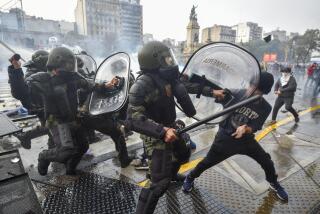Strike Protests Argentine Austerity
- Share via
BUENOS AIRES — Peronist-led labor unions drew partial support around Argentina on Thursday for a nationwide strike protesting Draconian measures of economic austerity. Tens of thousands of strikers massed in downtown Buenos Aires to cheer attacks on the International Monetary Fund and the government of President Raul Alfonsin.
The 11-hour general strike, the third in a year by the General Workers’ Confederation, shut factories in the industrial belt around this capital but caused only minor disruptions in other parts of the city.
Most shops, restaurants, banks, schools and offices were open, although some closed early as drum-banging, banner-waving strikers spilled peacefully through downtown streets in springlike weather.
Government offices functioned with nearly complete staffs, while skeleton crews safeguarded essential services. Public transport was normal except for symbolic stoppages of 15 minutes Thursday afternoon and two hours after the evening rush hour. Staffs of radio and television stations observed stoppages of 15 minutes per hour.
Buses Burned
Reports from the provinces mirrored the same partial support as in the capital. In Salta province in the north, the strike was scarcely noticed, while in the oil city of Comodoro Rivadavia in the south, its impact was nearly total, the news agency DYN reported.
Scattered minor violence was reported. Two people were burned, one seriously, in the firebombing of a bus in Jujuy in the north, while strikers burned two buses and smashed shop windows in the southern grain port of Bahia Blanca.
Addressing strikers at the mass rally in downtown Buenos Aires, Saul Ubaldini, co-secretary general of the 5.4-million-member Workers’ Confederation, said, “The only solution for stagnation is to break the links with international usury, with the IMF.”
Osvaldo Borda, the other secretary general, derided the Alfonsin government as “a total personification of American imperialism.”
The unions demand higher wages, economic reactivation and a moratorium on repayment of Argentina’s nearly $50-billion foreign debt. Alfonsin called Thursday’s strike a political gesture by union leaders hoping to enhance Peronist chances in November’s congressional elections.
Emergency Reforms
Thursday’s protest was the first major expression of worker discontent since the Alfonsin government undertook emergency economic reforms June 14 in an attack on inflation then running at an annual rate of about 1,000%.
The reforms, which included wage and price controls, establishment of a new unit of currency (the austral) and a promise to stop the increase in the money supply, are termed successful by the government. They still enjoy broad popular support, according to recent polls that show Alfonsin’s popularity as high as 75%.
Argentina’s foreign creditors have also applauded the austerity program, which dropped inflation from 30% per month in June to around 6% in July, with about the same figure anticipated for August. The international confidence has brought disbursement of a $1.4-billion standby loan from the IMF and the signing in New York earlier this week of a $4.2-billion debt restructuring loan from more than 300 foreign banks.
More to Read
Sign up for Essential California
The most important California stories and recommendations in your inbox every morning.
You may occasionally receive promotional content from the Los Angeles Times.










